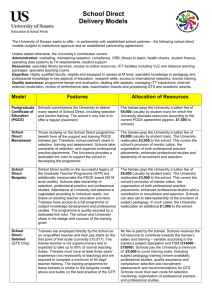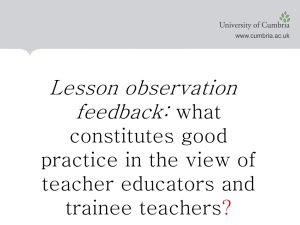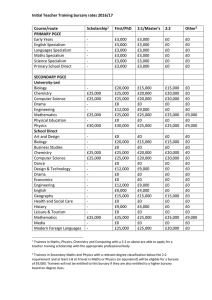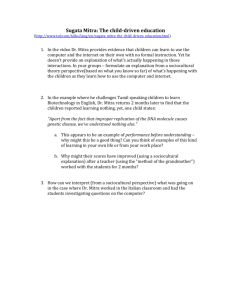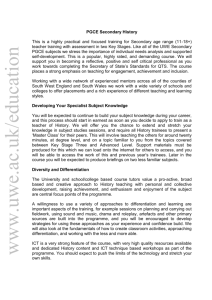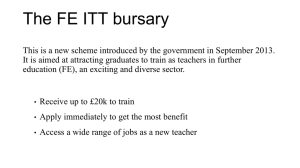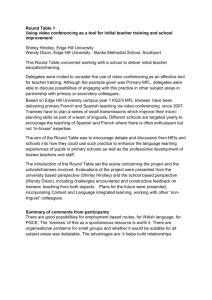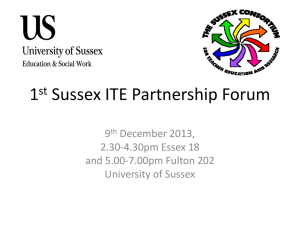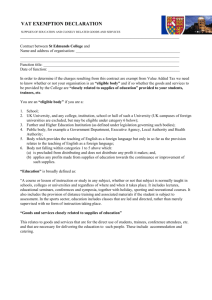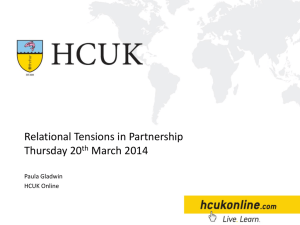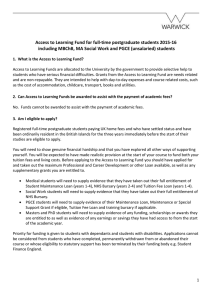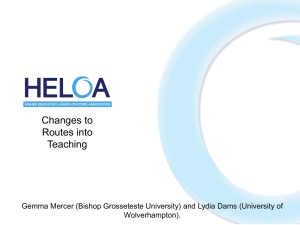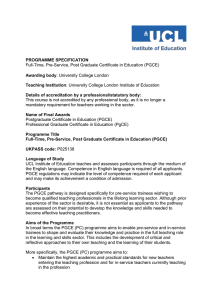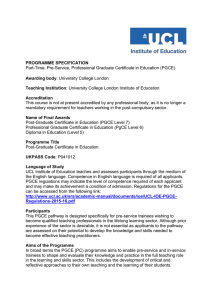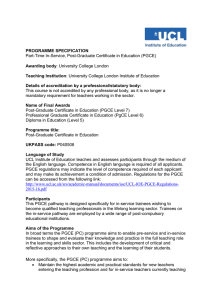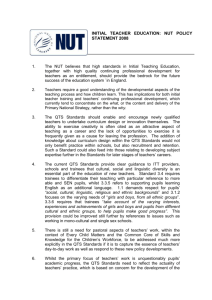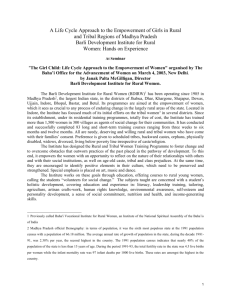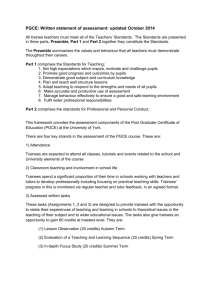Shall I be a teacher?
advertisement
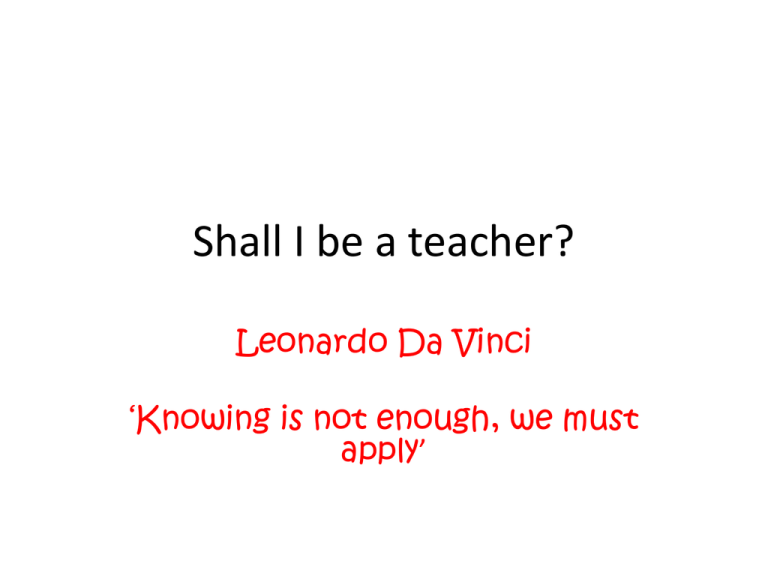
Shall I be a teacher? Leonardo Da Vinci ‘Knowing is not enough, we must apply’ Why being a teacher is so great! Some say ‘Education is a business but teaching is a calling’ ‘If education is expensive, try ignorance’ ‘Nine-tenths of education is encouragement’ ‘I like a teacher who gives you something to take home to think about besides homework’ ‘Teachers should be the highest paid employees on earth’ Why being effective in the classroom is so important! http://www.youtube.com/watch?v=VRi8_ fXz1D8 Why is teaching and learning so important? ‘It does not matter very much which school you go to but it matters very much which classrooms you are in at the school. An effective school is actually little more than a school full of effective classrooms. If you are in one of the most effective classrooms you will learn in six months what children in the average classroom will take a year to learn. And if you are in one of the least effective classrooms, that same learning will take you two years... Interestingly it is not class size, it is not setting, it is not streaming, nor even how the teachers group the students within the class. It is actually just what the teacher is doing..’ A child-driven education! Education scientist Sugata Mitra tackles one of the greatest problems of education -- the best teachers and schools don't exist where they're needed most. In a series of real-life experiments from New Delhi to South Africa to Italy, he gave kids self-supervised access to the web and saw results that could revolutionize how we think about teaching. Sugata Mitra's "Hole in the Wall" experiments have shown that, in the absence of supervision or formal teaching, children can teach themselves and each other, if they're motivated by curiosity and peer interest http://www.ted.com/talks/sugata_mitra_the_child _driven_education.html The Wisdom of Crowds How can we tell if a student is engaged in our lesson? http://viewpure.com/dxPVyieptwA Questioning in Science: discussion Ice‐cubes are added to a glass of water. What happens to the level of the water as the ice cubes melt? Questioning technique: random count/ basketball A. The level of the water drops B. The level of the water stays the same C. The level of the water increases D. You need more information to be sure Teach and Tell Activity 37 44 18 27 39 C3B4Me Activates the learning • Peer Modelling – Mirror Neurons • Verbalisation = Metacognition • Other benefits Other ideas * Describing or standing in order to show the stages of a process, a sequence of events Stand up, hand up, pair up An award winning photo taken in 1994 during the Sudan famine. The picture depicts a famine stricken child crawling towards an United Nations food camp, located a kilometer away. The vulture is waiting for the child to die so that it can eat it. This picture shocked the whole world. No one knows what happened to the child, including the photographer Kevin Carter who left the place as soon as the photograph was taken. Three months later he committed suicide due to depression. Improving Literacy is a National Priority One in six people in the UK struggle with literacy. This means their literacy is below the level expected of an eleven year old Men and women with poor literacy are least likely to be in full-time employment at the age of thirty From September 2013 the government requires that anyone entering a career in teaching pass the skills tests before starting their course. The pass mark for these tests will be raised and the number of resits allowed will be limited to two. Those that fail cannot resit for two years! Subjects Places will be available for primary and for priority secondary subjects including maths, physics, chemistry and modern languages plus a limited number of other secondary subjects • Art and Design Not always as • Design Technology clear cut as it • English seems – subject • Geography knowledge • History enhancement • Computing and ICT courses for • Mathematics degrees that do • Modern Foreign Languages (various combinations) not ‘quite fit’ • Music • Physical Education • Religious Education • Physics • Chemistry • Biology • Physics with Mathematics School Direct School Direct– a one year direct route into teaching where successful applicants follow a PGCE (Postgraduate Certificate in Education) with QTS but are trained predominantly in schools in a range of secondary subjects for the 11-16(18) age. There is the expectation that by the end of the training period, trainees will then go on to work within the school or group of schools in which they were trained. The NWSDP (North West School Direct Partnership), working with the University of Cumbria is made up of several schools in the North West that have a proven track record in providing outstanding teacher training. The schools enable students to focus on their specialist subject whilst, at the same time, helping them to understand and participate in the wider aspects of school. As it is a Postgraduate Certificate in Education, it entails work at Masters Level (level 7). This recognises the high levels achieved by students on this programme and rewards this with 60 Masters-level credits. • • • • • Bishop Rawstorne CE Academy, Croston, Leyland Parklands High School, Chorley Ripley St Thomas, Lancaster Westleigh High School, Leigh Lymm High School More coming on board all the time! Which School Direct Route? School Direct now offers two types of training places for September 2013 recruitment; the School Direct Training Programme and the School Direct Training Programme (salaried). There will be no standard model for School Direct training, but you can expect to spend the majority of your time training in the classroom, helping to build your confidence in a school environment and receiving mentoring support. Courses should generally last for one year full-time, starting from September 2013 Following the closure of the Graduate Teacher Programme (GTP), the School Direct Training Programme (salaried) will be open to graduates with three or more years’ career experience. Trainees will be employed as an unqualified teacher with a salary subsidised by the Teaching Agency. Funding How much will it cost? Trainees on a School Direct course will have to pay tuition fees to cover the cost of the course, but home and EU trainees will be eligible for a tuition fee loan to cover the cost of these fees and will not have to pay anything back until they are earning over £21,000 per annum. Tuition fees will vary depending on the institution and the maximum fee you can be charged is £9,000 Is there any additional funding available? You may be eligible to receive a bursary while you train dependent on teaching subject and a degree class of at least 2:2. Find out about bursary information. If you train in a school where more than a quarter of pupils are eligible for free school meals you may, if eligible, also receive an additional 25 per cent training bursary top-up. Home trainees can also apply for a means-tested maintenance grant of up to £3,250 and a maintenance loan of up to £5,500 (more if you live away from home and you study in London). More details of how to apply for funding can be found on Information is on the TDA web-site – http://www.education.gov.uk/get-into-teaching/teacher-training-options/school-basedtraining/school-direct?keywords=school+direct PGCE A PGCE is a one year course and a more university based route into teaching where successful applicants can follow a PGCE with QTS course and be trained both in a university setting and within a school based environment. Assignments will gain you 60 credits at level 7 towards a Masters. Apply to higher education institute or some local colleges (Runshaw – 2 years) What do you need? • • • • • • • • • Degree – 2.2 (!) or above in a relevant subject Good numeracy and literacy skills Ability to work hard and accept advice Organised, efficient and able to multi-task! Articulate and confident – a good communicator Ability to show initiative – think outside the box! Resilience in the face of challenge Passion and enthusiasm for your subject You like children and want to inspire them! Why being in teaching …and learning is so exciting! “I have come to a frightening conclusion. I am the decisive element in the classroom. It is my personal approach that creates the climate. It is my daily mood that makes the weather. As a teacher I possess tremendous power to make a child’s life miserable or joyous. I can be a tool of torture or an instrument of inspiration. I can humiliate or humour, hurt or heal. In all situations it is my response that decides whether a crisis will be escalated or deescalated, and a child humanized or dehumanized.” Haim Ginott
